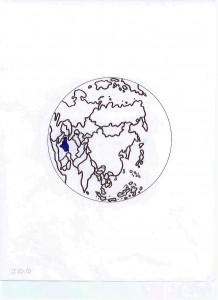IRAQ
A. THE COUNTRY
The Republic of Iraq is a country in Western Asia of 438,317 sq. km. The Tigris and Euphrates rivers provide Iraq with agriculturally capable land. There are high mountains to the north and Syrian desert in the southwest. Control and distribution of wealth from oil dominates politics, and there is rampant corruption in government. The 2010 Sunni-backed alliance of political groups formed a representative and constitutional democracy. The country is difficult to govern peacefully as the politics are affected by longstanding rivalries (Shi’a-Sunni and Arab-Kurd) combined with Islamic terrorism.
B. THE PEOPLE
The population is ~31,466,700. The official language is Arabic; Kurdish in the KAR. Dictatorship, two Gulf Wars and 13 years of UN sanctions devastated the economy and impoverished many people. In 2007, the UN said that about 40% of Iraq’s middle class is believed to have fled to other countries, fleeing mostly from systematic persecution.
Arab are 74.3%(Iraqi Arab 64.8%; Najdi Bedouin 4.4%; Egyptian Arab 1.2%)
Iranian-Median are 22% (10 groups, largest: Northern Kurd 9.8%; Southern
Kurd 7.8%; Central Kurd 1.6%; Persian 1.1%)
Turkic 2.5% in centre and north
Other 1.2% other Middle East peoples, Western, Asian.
C. RELIGIONS AND CHRISTIANITY/PENTECOSTALISM
dsfv
The new constitution states that no law can be passed that contravenes Islam, so guarantees of religious freedom are not trustworthy.
~95.91% are Muslim, ~1.9% Other, ~1.59% Christian, ~0.6% Non-religious.
In the Christian category:
Catholic ~1.18%, Orthodox ~0.23%, Independent ~0.13%, Protestant ~0.04%,
Anglican ~0.01%.
Evangelicals are 0.2% of the population and growing rapidly.
Charismatics are 0.1% and of those <0.1% are Pentecostals.
Donna Siemens
References:
http://en.wikipedia.org
Operation World, Jason Mandryk. Colorado Springs: Biblica Publishing, 2010.

